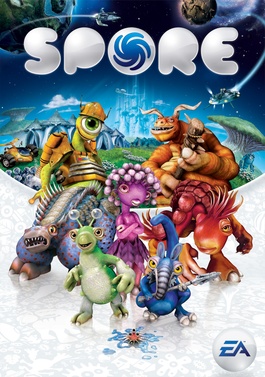Related Research Articles

Maxis is an American video game developer and a division of Electronic Arts (EA). The studio was founded in 1987 by Will Wright and Jeff Braun, and acquired by Electronic Arts in 1997. Maxis is best known for its simulation games, including The Sims, Spore and SimCity.

William Ralph Wright is an American video game designer and co-founder of the game development company Maxis, which later became part of Electronic Arts. In April 2009, he left EA to run Stupid Fun Club Camp, an entertainment think tank in which Wright and EA are principal shareholders.

SimCity 4 is a city-building simulation computer game developed by Maxis, a subsidiary of Electronic Arts. The game was released in January 2003 for Microsoft Windows and in June 2003 for Mac OS X. It is the fourth major installment in the SimCity series. SimCity 4 has a single expansion pack called Rush Hour which adds features to the game. SimCity 4: Deluxe Edition contains the original game and Rush Hour combined as a single product.

SimCity 2000 is a city-building simulation video game jointly developed by Will Wright and Fred Haslam of Maxis. It is the successor to SimCity Classic and was released for Apple Macintosh and MS-DOS personal computers in 1993, after which it was released on many other platforms over the following years, such as the Sega Saturn and SNES game consoles in 1995 and the PlayStation in 1996.

SimCity 3000 is a city building simulation video game released in 1999, and the third major installment in the SimCity series. It was published by Electronic Arts (EA) and developed by series creator Maxis. It was released for Microsoft Windows, Macintosh, and, through an arrangement with Loki Games, Linux.

Electronic Arts Inc. (EA) is an American video game company headquartered in Redwood City, California. Founded in May 1982 by former Apple employee Trip Hawkins, the company was a pioneer of the early home computer game industry and promoted the designers and programmers responsible for its games as "software artists". EA published numerous games and some productivity software for personal computers, all of which were developed by external individuals or groups until 1987's Skate or Die! The company shifted toward internal game studios, often through acquisitions, such as Distinctive Software becoming EA Canada in 1991.

The Sims 3 is a 2009 social simulation video game developed by the Redwood Shores studio of Maxis, and published by Electronic Arts. Part of The Sims series, it is the sequel to The Sims 2. It was released on June 2, 2009, for Microsoft Windows, MacOS, and mobile versions. Console versions were released for PlayStation 3, Xbox 360, and Nintendo DS in October 2010 and a month later for Wii. The Windows Phone version was released on October 15, 2010. A Nintendo 3DS version, released on March 27, 2011, was one of the platform's launch titles.
SimCity is an open-ended city-building video game franchise originally designed by Will Wright. The first game in the series, SimCity, was published by Maxis in 1989 and was followed by several sequels and many other spin-off Sim titles, including 2000's The Sims, which itself became a best-selling computer game and franchise. Maxis developed the series independently until 1997, and continued under the ownership of Electronic Arts until 2003. EA commissioned various spinoffs from other companies during the 2000s, focusing on console and mobile releases. A 2013 EA-Maxis reboot was subject to what has been described as "one of the most disastrous launches in history", which may have triggered the 2015 shutdown of Maxis Emeryville and the end of the franchise.

SimCity is a city-building and urban planning simulation massively multiplayer online game developed by Maxis Emeryville and published by Electronic Arts. Released for Microsoft Windows in early March 2013, it is a reboot of the SimCity series, and is the first major installment since the release of SimCity 4 a decade before. A macOS version was released on August 29, 2013.
Spore is a video game developed by Maxis and designed by Will Wright, released in September 2008. The game has drawn wide attention for its ability to simulate the development of a species on a galactic scope, using its innovation of user-guided evolution via the use of procedural generation for many of the components of the game, providing vast scope and open-ended gameplay.

The Sims is a series of life simulation video games developed by Maxis and published by Electronic Arts. The franchise has sold nearly 200 million copies worldwide, and is one of the best-selling video game series of all time. It is also part of the larger Sim series, started by SimCity in 1989.

Spore is a 2008 life simulation real-time strategy god game developed by Maxis and published by Electronic Arts for Microsoft Windows and Mac OS X. Designed by Will Wright, it covers many genres including action, real-time strategy, and role-playing games. Spore allows a player to control the development of a species from its beginnings as a microscopic organism, through development as an intelligent and social creature, to interstellar exploration as a spacefaring culture. It has drawn wide attention for its massive scope, and its use of open-ended gameplay and procedural generation. Throughout each stage, players are able to use various creators to produce content for their games. These are then automatically uploaded to the online Sporepedia and are accessible by other players for download.

Spore Hero is 2009 action-adventure game developed by EA Montreal and published by Electronic Arts. It is a Nintendo Wii spin-off of Spore in which the players focus on creativity and evolution using the controls of the Wii. The game was released in October 2009.

Darkspore is a video game that borrowed creature editing technology from Spore. It was described as "a fast-paced, science fiction action role-playing game in which the player battled across alien worlds to save the galaxy from the mutated forces of Darkspore". In addition to the creature editor, the game features a unique squad-based mechanic, various multiplayer options, and a player versus player arena. The game was released in North America on April 26, 2011, for Microsoft Windows, and in Europe on April 28, 2011.

The Sims 4 is a social simulation game developed by Maxis and published by Electronic Arts. The game was released on September 2, 2014 for Windows, and is the fourth main installment in The Sims series, following The Sims 3 (2009). As with previous games in the series, The Sims 4 allows players to create and customize characters called "Sims", build and furnish their homes, and simulate their daily life across various in-game regions. This installment introduced a newly developed custom game engine, with enhanced character creation and house-building tools, along with a more complex in-game simulation.
Laura Miele is an American businesswoman who serves as President of EA Entertainment, Technology & Central Development, where she oversees Electronic Arts' studios other than those responsible for its sports titles. She formerly served as COO and Chief Studios Officer at EA. Under her tenure, the company has developed several games in the industry, including Battlefield, Star Wars, Need for Speed, The Sims, Bejeweled, Mass Effect, and the EA Sports portfolio.
References
- 1 2 Abra Pressler (July 18, 2016). "Profile: Lucy Bradshaw". Historically Her Story. Retrieved January 6, 2017.
- 1 2 Noah Robischon (November 19, 2010). "Innovation Agents: Lucy Bradshaw, Senior Vice President at Electronic Arts". Fast Company . Retrieved January 6, 2017.
- 1 2 3 4 Austin Carr (March 24, 2010). "The Most Influential Women in Technology - Lucy Bradshaw". Fast Company. Retrieved January 6, 2017.
- 1 2 Jeff Grubb (September 24, 2015). "The Sims boss Lucy Bradshaw is leaving Electronic Arts". VentureBeat . Retrieved January 6, 2017.
- ↑ Samit Sarkar (September 24, 2015). "Maxis boss Lucy Bradshaw leaves EA, studio being brought under EA's mobile division". Polygon . Retrieved January 6, 2017.
- ↑ "Lucy Bradshaw Named to Fortune's "10 Most Powerful Women in Gaming"". Electronic Arts. October 30, 2013. Archived from the original on April 19, 2016. Retrieved January 6, 2017.
- ↑ Dean Takahashi (June 11, 2008). "An interview with EA Maxis' Lucy Bradshaw on the making of Spore". VentureBeat. Retrieved January 6, 2017.
- ↑ Michael McWhertor (March 15, 2013). "SimCity general manager Lucy Bradshaw on why the game 'is not an offline experience'". Polygon. Retrieved January 6, 2017.
- ↑ Stephen Totilo (March 8, 2013). "Gridlock Plagues the New Online-Only SimCity". The New York Times . Retrieved January 6, 2017.
- ↑ John Gaudiosi (October 24, 2013). "The 10 most powerful women in gaming". Fortune. Retrieved January 6, 2017.
- ↑ Josh Constine (October 11, 2016). "Facebook hires The Sims' Rachel Rubin Franklin to lead Social VR team". TechCrunch. Retrieved January 6, 2017.